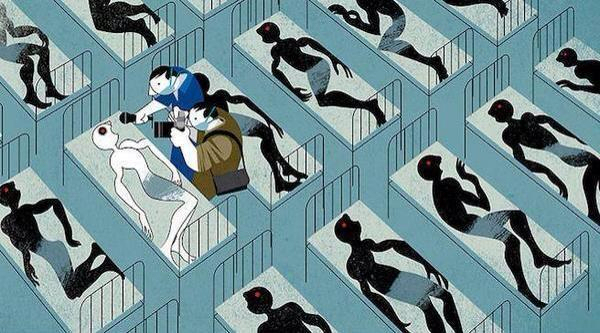
Last week, Thomas Eric Duncan — a Texas man who contracted Ebola while travelling overseas — died, becoming the first fatality as a result of the virus on US soil. Questions are already being raised about doctors’ handling of Duncan’s case: Duncan first became symptomatic on September 26th when he arrived in the ER of Texas Health Presbyterian with a 103-degree fever, but was inexplicably sent home even after doctors were notified that Duncan had recently returned from Africa. Only upon his second visit to the hospital on September 28th was Duncan diagnosed with Ebola and quarantined for treatment; the circumstances of his treatment significantly enhanced the likelihood of an American outbreak.
In the wake of this failure in proper care, the CDC had placed over 50 people who had come into close contact with Duncan under supervision. Today, the CDC reports that a nurse who worked in critical care at Texas Presbyterian Health has contracted Ebola. Although officials did not identify the nurse, family members have since revealed to media that the nurse is 26-year-old Nina Pham.
Pham graduated from Texas Christian University in 2010, and has been a nurse since she graduated. Yesterday, officials reported that Pham began experiencing symptoms late last week and was placed in immediate quarantine. She is now in stable condition after being diagnosed on Sunday with the virus.
Ebola is a haemorrhagic disease that targets endothelial cells — the cells that line the inner layer of blood vessels — and is fatal in approximately 50% of cases. The speed of infection and the lack of any approved drugs in the cure of the virus — along with a healthy dose of misinformation — have led to panic over the disease in the States. A recent poll shows that 41% of Americans lack confidence in the US government’s capacity to control an Ebola outbreak, while one-third are afraid that they or a family member are at risk for contraction.
However, it is important to emphasize that the risk of an American outbreak is still considered to be low for the average American: Ebola is transmitted through direct contact with the bodily fluids (blood, sweat, urine, feces, semen, etc) of a symptomatic patient. Thus, those at highest risk for contracting Ebola are caregivers, and in the States, widespread access to sophisticated diagnosis and patient isolation technology significantly reduces the likelihood of outbreak, while availability of modern medical treatments maximize the chances of Americans to survive the infection.
In Africa, however, the lack of international aid have allowed the disease to claim thousands of lives for the last four decades. Over the past seven months, a single Ebola outbreak in Sierra Leone, Guinea and Liberia has infected nearly 8,500 people and claimed over 4,000 lives; yet, Americans have been largely apathetic to this outbreak. That our disinterest gave way to panic only when a White American doctor contracted the disease is telling. That we remain resistant to caring about Ebola patients because they are “out of sight” and therefore “out of mind” is alarming. That politicians — including former South Carolina GOP Executive Director — feel no qualms advocating the execution of patients at risk of transmitting Ebola is terrifying.
https://twitter.com/Todd__Kincannon/status/518499096974614529
This past weekend, thousands of activists journeyed to Ferguson, Missouri in the latest #BlackLivesMatter protest over the police shooting of unarmed teenager Mike Brown. While this ongoing national conversation over the value of Black lives in America, perhaps it is time to connect the dots globally.
Today, we must focus our prayers towards Nina Pham and the entire Pham family in hopes that Ms. Pham makes a complete recovery from the virus. But, we shouldn’t care about Nina Pham just because she is young and American — or (in the case of our community) because she is Asian American. We should care about Nina Pham’s current battle against the Ebola virus because she is a fellow traveller on this Earth who deserves better than this disease. As such, we should also focus our attention and energy — as well as our medical resources — towards Africa, where lives equally as valuable are being lost to this virus every day, and largely with our silence. Patients fighting Ebola throughout the world deserve our help and our care, not the business end of our rifles; and yes, they deserve that attention even if those patients are Black.
Black lives matter, and they should matter everywhere.

